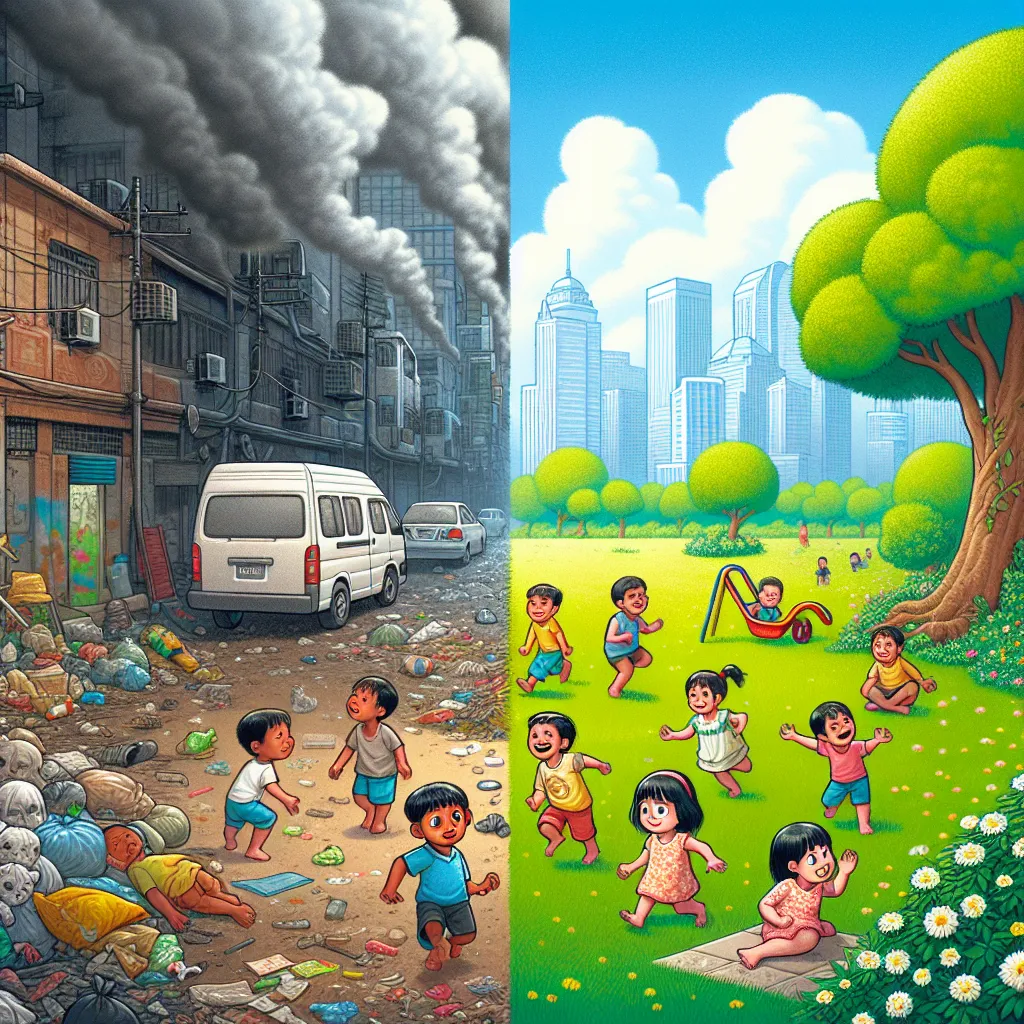Air pollution and its impact on children’s health is a growing concern worldwide. This topic has been increasingly appearing in IELTS Writing Task 2 questions, reflecting its relevance in today’s society. Based on recent trends, we can expect this subject to continue being a popular choice for examiners in the coming years. Let’s explore some potential questions and focus on one for our sample essay.

Potential IELTS Writing Task 2 Questions
-
Some people believe that governments should focus on reducing air pollution in cities to improve children’s health. To what extent do you agree or disagree?
-
The effects of air pollution on children’s health are becoming more severe. What are the causes of this problem, and what measures can be taken to solve it?
-
Many experts argue that air pollution has a more significant impact on children than adults. Discuss the possible reasons for this and suggest ways to protect children from the harmful effects of air pollution.
For our sample essay, we’ll focus on the third question, as it allows for a comprehensive discussion of the topic.
Analyzing the Question
Many experts argue that air pollution has a more significant impact on children than adults. Discuss the possible reasons for this and suggest ways to protect children from the harmful effects of air pollution.
This question requires a two-part response:
- Discuss why air pollution affects children more severely than adults.
- Propose solutions to protect children from air pollution’s harmful effects.
Key points to consider:
- Physiological differences between children and adults
- Children’s lifestyle and behavior patterns
- Long-term consequences of exposure during developmental years
- Preventive measures at individual, community, and governmental levels
Sample Essay
Air pollution is a global concern that affects people of all ages, but experts increasingly recognize its disproportionate impact on children. This essay will explore the reasons behind children’s heightened vulnerability to air pollution and propose measures to safeguard their health.
There are several compelling reasons why air pollution poses a greater threat to children than adults. Firstly, children’s respiratory systems are still developing, making them more susceptible to irritants and pollutants in the air. Their lungs have a larger surface area relative to their body size, leading to higher exposure to harmful particles. Additionally, children breathe more rapidly than adults, further increasing their intake of pollutants. Secondly, children tend to spend more time outdoors, engaging in physical activities that require deeper and more frequent breathing, thus inhaling more polluted air. Moreover, their shorter stature puts them closer to ground-level pollutants, such as vehicle exhaust fumes. Lastly, the long-term effects of exposure during crucial developmental years can lead to chronic health issues and reduced lung capacity in adulthood.
To protect children from the detrimental effects of air pollution, a multi-faceted approach is necessary. At the individual level, parents and caregivers should monitor air quality reports and limit children’s outdoor activities on high-pollution days. Encouraging the use of protective masks when necessary and ensuring proper indoor air filtration can also help. Schools can play a crucial role by implementing policies to restrict outdoor activities during peak pollution hours and educating students about air quality awareness. At the community level, promoting eco-friendly transportation options, such as cycling and walking, can reduce vehicular emissions. Governmental action is paramount, including stricter regulations on industrial emissions, investment in renewable energy sources, and urban planning that prioritizes green spaces and air quality.
In conclusion, the heightened vulnerability of children to air pollution stems from their physiological characteristics and behavioral patterns. Protecting them requires a collaborative effort from individuals, communities, and governments. By implementing comprehensive strategies to reduce air pollution and mitigate its effects, we can safeguard the health and future of our younger generation.
(Word count: 339)
Key Writing Tips
-
Structure: Ensure a clear introduction, body paragraphs addressing both parts of the question, and a conclusion summarizing main points.
-
Vocabulary: Use a range of topic-specific vocabulary related to air pollution and health. For example:
- pollutants
- respiratory system
- vehicular emissions
- air quality
-
Grammar: Utilize a mix of sentence structures, including complex sentences with subordinate clauses. For instance:
- “While adults are also affected by air pollution, children are particularly vulnerable due to their developing respiratory systems.”
-
Cohesion: Use linking words and phrases to connect ideas smoothly:
- Firstly, Secondly, Moreover, Furthermore, In conclusion
-
Task Achievement: Address all parts of the question comprehensively, providing reasons and solutions as required.
Important Vocabulary
-
Disproportionate (adjective) /ˌdɪsprəˈpɔːʃənət/: Too large or too small in comparison with something else.
-
Susceptible (adjective) /səˈseptəbl/: Likely or liable to be influenced or harmed by a particular thing.
-
Pollutants (noun) /pəˈluːtənts/: Substances that contaminate the environment.
-
Vehicular (adjective) /vɪˈhɪkjələr/: Relating to or used by vehicles.
-
Mitigation (noun) /ˌmɪtɪˈɡeɪʃn/: The action of reducing the severity, seriousness, or painfulness of something.
-
Chronic (adjective) /ˈkrɒnɪk/: Persisting for a long time or constantly recurring.
-
Eco-friendly (adjective) /ˌiːkəʊ ˈfrendli/: Not harmful to the environment.
-
Emissions (noun) /ɪˈmɪʃn/: The production and discharge of something, especially gas or radiation.
Conclusion
The effects of air pollution on children’s health is a critical topic that is likely to appear in future IELTS Writing Task 2 questions. By understanding the key aspects of this issue and practicing with sample questions, you can prepare effectively for your exam. Remember to focus on clear structure, relevant vocabulary, and comprehensive addressing of all parts of the question. Some additional topics you might encounter could include:
- The role of schools in protecting children from air pollution
- Comparing air pollution’s effects in urban versus rural areas on children’s health
- The economic impact of children’s health issues caused by air pollution
Stay informed about environmental issues and practice writing essays on related topics to enhance your IELTS Writing skills.